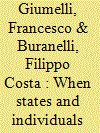| Srl | Item |
| 1 |
ID:
160387


|
|
|
|
|
| Summary/Abstract |
Since the annexation of Crimea in 2014, Russia’s “eastward pivot” has intensified, mainly observable as strengthened relations with China, which appear to be evolving into a quasi-alliance. This places in question Russian attempts at diversification in the Asia-Pacific, and its position in Central Asia, where China’s Belt and Road Initiative challenges Russian influence.
|
|
|
|
|
|
|
|
|
|
|
|
|
|
|
|
| 2 |
ID:
164946


|
|
|
|
|
| Summary/Abstract |
Russia’s “Asian pivot” remains focused on China, despite energetic Russian diplomacy in 2018 vis-à-vis Japan and India. The benefits of the enlargement of the Shanghai Cooperation Organisation to include Pakistan and India remained unclear, and the overlapping memberships of regional organizations highlighted the challenges for security and economic cooperation in Central Asia.
|
|
|
|
|
|
|
|
|
|
|
|
|
|
|
|
| 3 |
ID:
172288


|
|
|
|
|
| Summary/Abstract |
Interaction between individuals and states is considered a distinctive character of domestic politics, while international politics is the ‘realm of states’. However, it is becoming more common to encounter loci where both states and individuals interact at the international level, such as in the cases of the Special Tribunals for Rwanda, Sierra Leone, Liberia and the Former Yugoslavia as well as the International Criminal Court (ICC). Within the International Relations (IR) theory panorama, one would expect the English School of International Relations (ES) to have the theoretical and analytical tools to conceptualize synergies between states and individuals, but this is not evident. This article asks, how does the interaction between individuals and states take place in the ES? We argue that this interaction takes place via ‘contact points’, defined as those international bodies that bring together states and non-state actors, be they individuals or groups, interacting on equal grounds in terms of rights and responsibilities towards each other. The notion of ‘contact point’ is developed inductively by focusing on the Office of the Ombudsperson to the Islamic State of Iraq and the Levant (ISIL; Da’esh) and Al-Qaida Sanctions Committee. This research has theoretical implications. We aim to refine, sharpen and advance both the ES’s theoretical and analytical architecture. The contribution we seek to make is one that will better equip ES scholars to conceptualize and analyse those secondary institutions that allow states and individuals to enjoy rights and duties equally. By so doing, we will make possible for the ES to provide a more fine-grained account for these synergies than other IR theories. The notion of ‘contact point’ does set a new agenda for the ES, since interactions between individuals and states are likely to become a constitutive essence of world politics.
|
|
|
|
|
|
|
|
|
|
|
|
|
|
|
|